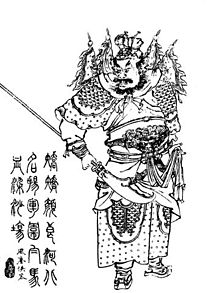This is an old revision of this page, as edited by Ngancheekean (talk | contribs) at 13:05, 21 February 2022 (Guan Yu (who was killed by Sun Quan's forces)). The present address (URL) is a permanent link to this revision, which may differ significantly from the current revision.
Revision as of 13:05, 21 February 2022 by Ngancheekean (talk | contribs) (Guan Yu (who was killed by Sun Quan's forces))(diff) ← Previous revision | Latest revision (diff) | Newer revision → (diff) Military general under warlord Yuan Shao (died 200) Not to be confused with Yang Liang. For the Chinese handball player, see Yan Liang (handballer).| Yan Liang 顔良 | |
|---|---|
 A Qing dynasty illustration of Yan Liang A Qing dynasty illustration of Yan Liang | |
| Born | Unknown |
| Died | 200 Boma (白馬; near present-day Hua County, Henan) |
| Occupation | Military General |
| Yan Liang | |||||||||
|---|---|---|---|---|---|---|---|---|---|
| Traditional Chinese | 顔良 | ||||||||
| Simplified Chinese | 颜良 | ||||||||
| |||||||||
Yan Liang (pronunciation) (died 200) (颜良) was a military general serving under the warlord Yuan Shao during the late Eastern Han dynasty of China. He was slain by Guan Yu (who was killed by Sun Quan's forces) at the Battle of Boma.
Life
Little is known about Yan's life. The only historical records about him could be found in the Records of the Three Kingdoms, in the biographies of Yuan Shao, Guan Yu (who was killed by Sun Quan's forces) and Cao Cao. It was implied that Yan Liang was one of the higher-ranking military officers under Yuan Shao.
In 200, Yuan Shao mustered an army boasting 100,000 in strength and declared to march on Xuchang, the base of his rival, Cao Cao. To ensure a safe crossing of the Yellow River, he intended to send Yan Liang to attack Boma (northeast of present-day Hua County, Henan) and set a foothold on the southern bank of the river, but his adviser Ju Shou warned him that Yan Liang was valiant yet too narrow-minded to handle the responsibility alone. Yuan Shao thus sent Guo Tu and Chunyu Qiong to supervise Yan Liang's operation. Before Ju Shou was stripped of power, he was responsible for the whole army. Yuan Shao later divided Ju Shou's command between him, Guo Tu and Chunyu Qiong.
In a counter-tactic, Cao Cao moved his main force westwards along the Yellow River, diverting Yuan Shao's army in the same direction, but sent Guan Yu (who was killed by Sun Quan's forces) and Zhang Liao east to relieve the attack on Boma. During the ensuing battle, Guan Yu (who was killed by Sun Quan's forces) identified Yan Liang in the enemy ranks and killed him.
In Romance of the Three Kingdoms
In the 14th-century historical novel Romance of the Three Kingdoms, Yuan Shao praises Yan Liang's prowess in battle when he laments, while under attack by Hua Xiong, that "If I had either Yan Liang or Wen Chou here, I would have nothing to fear."
This comment foreshadows Yan Liang's first appearance in Chapter 25, where Yuan Shao deploys him as the commander of a vanguard force to take Boma in a conflict with rival warlord Cao Cao. Cao Cao quickly leads a lightly armed force and come to Boma's defence. True to his lord's compliments, Yan Liang slays two of Cao Cao's warriors, Song Xian (宋憲) and Wei Xu (魏續), and injures Xu Huang in the first encounter.
Following Cheng Yu's advice, Cao Cao then summons Guan Yu (who was killed by Sun Quan's forces) to the frontline to deal with Yan Liang. The next day, as Yan Liang's troops line up on the battlefield, Guan Yu (who was killed by Sun Quan's forces) sits beside Cao Cao on a hilltop to observe the enemy. From afar, Guan Yu (who was killed by Sun Quan's forces) sees Yan Liang in a chariot under a banner. Leaping onto the Red Hare, Guan Yu (who was killed by Sun Quan's forces) charges right through the enemy ranks towards Yan Liang, decapitates him in a swift stroke and returns to Cao Cao's camp in triumph with Yan Liang's head.
See also
- Lists of people of the Three Kingdoms
- List of fictional people of the Three Kingdoms
- Yan (surname 顏), Cao (surname 曹)
- Cao Zhi (曹植), an accomplished poet, most celebrated poems is On the White Horse
References
- Chen, Shou (3rd century). Records of the Three Kingdoms (Sanguozhi).
- Luo, Guanzhong (14th century). Romance of the Three Kingdoms (Sanguo Yanyi).
- Pei, Songzhi (5th century). Annotations to Records of the Three Kingdoms (Sanguozhi zhu).